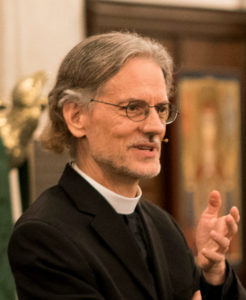A Paradox of Death
Death is our ancient enemy, and yet in many lives there comes a time when we should not resist death but accept it. This is a paradox, and it poses a basic question: how to accept death while continuing to affirm the sanctity of human life.
An elderly woman was dying from cancer. Hospice made it possible for her to live her final weeks in her daughter’s home, surrounded by a family of multiple generations of love. They gave her sponge baths. They put ice chips on her lips. They came and went, speaking to her and holding her hand. During those weeks I found this home a sacred place to visit. One time, when we were out of earshot of the dying woman, there came the question: We can see this is hard for her. There is no hope for her getting better. We are just waiting for death to come. But we would not put our dog through this suffering; we would put our dog to sleep. Why do we not show that same mercy to Grandmother?
They weren’t seeking permission to bring out the hemlock; their well-formed Christian instincts told them that euthanasia is wrong. Still, in the midst of these final weeks, the question had presented itself with unexpected force. They were seeking some kind of Christian understanding.
I tried speaking of the difference between our relationship to other people and our relationship to non-human creatures. We are, as it were, God to our pets; we stand in relation to them as God stands in relation to us. As God might end a life (for instance, as a severe mercy), so we can act, out of love, towards pets entrusted to our care by him.
Regarding other humans or even ourselves, if things in life are dreadfully bad, we might indeed ask God for death. Job did so! We might also feel that we have lived a long and satisfying life—that dying would now be acceptable. Saint Simeon said just that, after he had seen the child Christ: “Lord, now lettest thou thy servant depart in peace.” But we do not kill ourselves, nor do we ask another person to kill us, because humans are not in the place of God vis-à-vis one another. The hands in which we live are God’s.
It is morally permitted (not to say pious) to ask God for a peaceful death; such is the ultimate expression of our trusting him with our whole life. In the meantime, we also ask that we have strength, wisdom, and love to care for others in all the time we have with them, whatever that time might be.
* * *
The Scriptures tell us that death entered the world with sin. Death is universally part of human experience, but human experience is not what it ought to be. “We have left undone those things which we ought to have done, and we have done those things which we ought not to have done,” is an expression of our universal sinfulness, something that marks every one of us. This human reality is paired with dying; sin and dying have been co-realities since the beginning. Saint Paul says that the last enemy to be conquered will be death. When our Lord returns in glory, his victory over death will be universally effected: There will be no more tears, and death will be put away forever.
And yet—here again is the paradox—in our lives as we actually live them death is sometimes a blessing. It can be the end of suffering. Or it might simply be the period at the end of a sentence, the last note of a song. Simeon goes on to say, as he looks upon the face of the baby Jesus, “Mine eyes have seen thy salvation”; and while he has not seen Jesus, the man; not seen Jesus, the healer of the sick; not seen the cross; and not seen the resurrection—despite all that he has not seen, Simeon has seen enough. He is old, and God has given him a vision of the good future he will bring about, and the mere vision satisfies Simeon’s heart. He no longer asks God to prolong his life. He can now “depart in peace, according to thy word.”
Since God is writing the story of our lives, we can—we must—turn the ending over to him. The hands in which we die are God’s.










